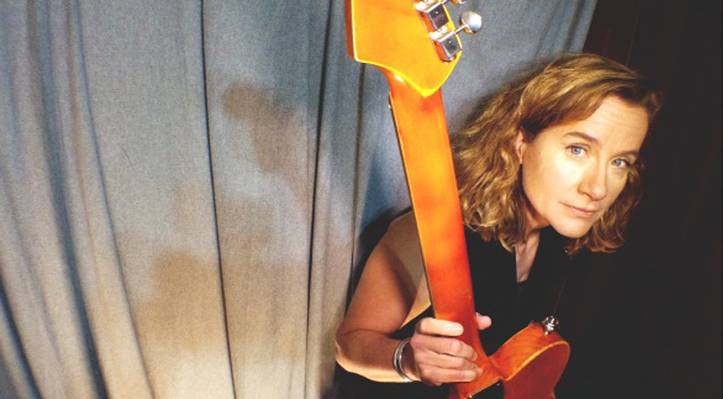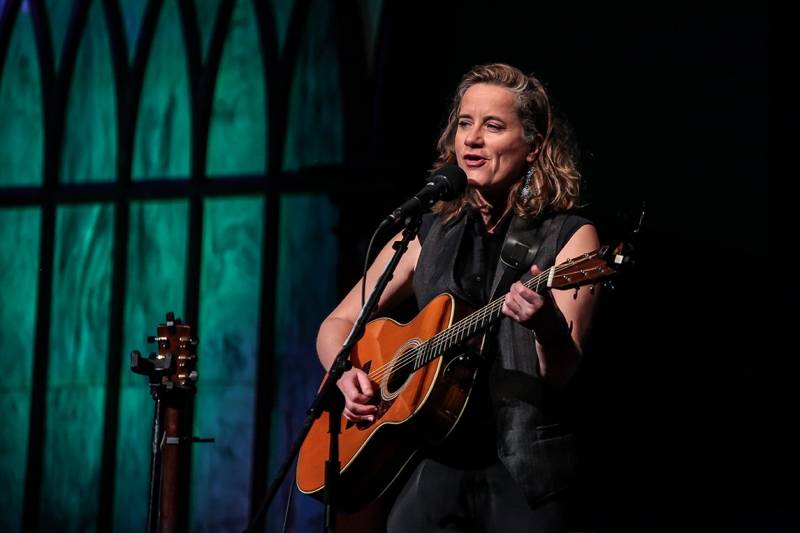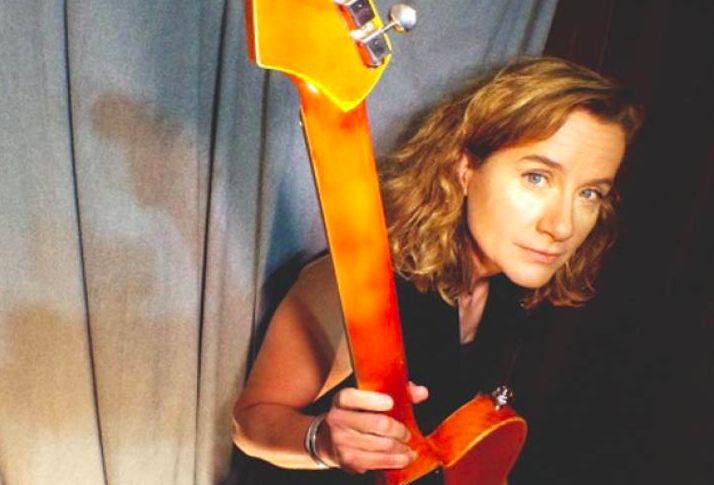
Although originally setting out to become an opera singer, Susan Werner has made a career for herself as a singer-songwriter. Werner grew up in rural Iowa, and after studying music in college, she found a home in Chicago, but spends most of her time on the road getting her music out to people. She grew talent for musical performance at an early age, learning piano and guitar and singing along, and has since come to understand the language of music as an integral part of her life. Her music encompasses a wide range of content, both musically and lyrically. Werner has been able to easily transition between genres of jazz, blues, folk and more in her music and most of her albums exist in their own specific context in regard to an idea or a movement. Werner attempts to, and succeeds at, writing music which can relate to a broad audience, and in a very personal way.
Werner has a certain excitement and exuberance about life which shows through her music and through the way she talks about music. She is devoted to her ability to connect with an audience and make sure they are having a good time, even if only for the evening which she spends with them. I got the chance to talk with Susan Werner and it was both wonderful and enlightening to hear about her fulfilling experiences and her earnest perspectives on being a musician.

Smile Politely: What can we expect to hear at Krannert this weekend? Will it be a solo set? Will there be some new material?
Susan Werner: So, I’m a singer-songwriter and I live in Chicago, but I travel all around the United States and my career is made up of these themed projects. From year to year I write songs under an umbrella, a title, or a theme. In previous years I’ve had projects like The Gospel Truth, which was all gospel music for agnostics; Hayseed is all songs about farms, farmers, and the people who love them. I’m working on a project now called An American in Havana — songs written after a trip to Cuba. The newest project is called Eight Unnecessary Songs — all songs that no one really needs, with titles such as: “What Did You Do To Your Face,” a song about cosmetic surgery; “You Kissed Your Dog On The Mouth,” a song about love gone wrong; a song called “Recumbent Bike” about the weird dudes who ride them. I’ll have with me this weekend a guy who plays piano and accordion incredibly well. This guy’s really a mad-cat genius. His name is Radislaz Lorkovic and he’s amazing. Between the two of us we have such a good time. The evening just flies by – it’s always over way too soon.
SP: That’s certainly a sign of a good show.
Werner: The forecast for this weekend: Zero percent chance of boredom. That’s what I can tell you.
SP: How long have you and Radislaz been collaborating?
Werner: The last two years we’ve been running around the country together. He’s fantastic. Some people, because he’s from Croatia, call him the “Croatian Sensation.”
SP: So you were saying your music is based off of concept albums? Is that what you would call them?
Werner: Yeah, what I like about a concept album is that it gives you and the audience a place to meet right away. If I tell you that the album is called The Gospel Truth, you’re going to expect something about religion. You don’t have to know anything about me personally. You just know that the songs are going to be about this topic. And there’s a good chance that these songs are written in a way that’s going to speak to you — that has a good chance of representing your experience and the audience’s experience. Not just my experience as the artist but the audience’s experience. That is really important to me as an artist and entertainer — that the audience is having a good time. I don’t know what else is going on in Champaign Urbana this weekend but I’m telling you, come see us. You need a good laugh? Come see us. You want to see amazing musicianship? Come see us. You want to forget whatever your day was like on Thursday, Friday, or Saturday? Come see us. It’s good medicine. Guaranteed good medicine — guaranteed results.
SP: Where do you find the inspiration or ideas to write concept albums if you’re trying to write about something that both the audience and you can relate to, but not something that you’ve been through personally?
Werner: If I hear two or three people within a short period of time talk about something – use the same phrase, the same words — I know something’s going on. The agriculture project really came about because I grew up on a farm in Iowa and my parents were moving off the farm into town, which really prompted the beginning of those songs. But at the same time, there came about this movement towards good food, for advocacy for farms and farmers, and this sort of momentum was gathering around it. And that makes it really easy to finish a project: when you feel like it’s not just you but this is on the minds of many people at a certain moment in time. That’s the kind of tailwind that really moves these projects toward success. Again, when it isn’t just me, but there’s something larger afoot. The Cuba project has been really rewarding to do because there’s been so much curiosity about Cuba and I got there earlier and I’m going back in December. There are so many people now who are curious about Cuba. People are starting to go [there], or think about going, and it is a fascinating place. I’m happy to bringing these songs to audiences now because we’re meeting them at a moment when this embargo could end at any minute and thing are changing so rapidly in Cuba in an exciting way, but Cuba has so far to go too. Again, Cuba is an object of fascination right now and I’m happy to have songs that reflect some of that and dig in as to what it is to go to Cuba – what it is to be American there. An American in Havana is what the project’s called.
SP: What made you want to go to Cuba?
Werner: As a musician, the idea of going to Cuba is irresistible. You get the sense that people are making music by hand and that it’s social, and this is something that I wanted to see. Same as with New Orleans: you have to go see this in person, you have to go hear it in person, and you have to go feel it in person. To see a brass band come down the street in New Orleans is an experience like no other. To be at a jazz club in Havana where the drummer and the percussionist are totally in sync and they’re just tearing the roof off this place… I will never forget that as long as I live. There’s an intensity to it and the virtuosity of the musicianship is mind-blowing. The idea of it was irresistible and I’m so glad I went. You have to see it for yourself. You have to see it first-hand.
SP: Did you take some musical influence from what you’ve heard [in Cuba] to write this new album?
Werner: Oh, yeah. Absolutely. I have a percussionist I’m working with from Havana and she has been with me every step of the way developing the material so that the styles are really true to what Cuban music is and isn’t. One has to be careful not to go to Brazil, one has to be careful not to go to Mexico, with these grooves. Cuban music is Cuban music. It’s a truly specific thing and when it’s done well, it’s thrilling. It has so much energy. It’s like the hottest musical molecule on the planet. I’ve had great help staying really true to these styles, and [it’s] a pleasure to write these styles. It’s almost like painting with different materials. I’ve written more melodic songs than I ever have before. These songs are more rhythmic, more driving, than any songs I’ve written before and of course the subject matter is different. What does an American notice when an American goes to Havana? Of course the cars, the coffee, the amazing musicianship, the architecture, but you also notice the poverty – What does that feel like? What does that look like? There’s a song called “The Stray Dogs.” There are so many stray dogs in Cuba and we don’t see them as much in the United States. So I wrote a song called “The Stray Dogs” which in the end isn’t really about stray dogs at all. It’s about human beings looking to belong to someone, including the tourists who have come to Cuba. What I love about doing these themed projects is they often have a style of music in them. Not only do they offer new subject matter, new things to write about, new language with which to write about it, they also have a musical style built in. That’s the most thrilling part of my job is cooking things up, almost like a chef, with a whole new palette every time around, and cooking things up with a whole new set of flavors. Cuba is the most flavorful thing I’ve ever whipped up yet because the flavor is built right in.

SP: To go back a little bit, I recall reading that you went in to study music in University of Iowa?
Werner: Yeah, University of Iowa, and then I went on to Temple University out in Philadelphia. So, I wanted to become an opera singer. I really love languages. Languages come easily to me; French, German, Italian and all that. But I wasn’t loud enough. I got out of graduate school and took some auditions and I simply was not a loud enough singer. You just have to make so much noise as an opera singer, and I just don’t have enough heft to me so I started writing songs again, and that has gone well for me ever since. I feel really fortunate to get to do what I do. The biggest blessing for me is that I learned how to play guitar when I was five. I started playing music at a really early age and it just feels so second nature to play guitar and play piano and sing with it. I feel very fortunate for those talents to have come so easily: to play, how to read music, or anything. I can definitely dig the life of playing with Radislaz. He is the same kind of musician. He’s been playing since he was a little kid and there’s great ease with it and surprise with it; he’s very nimble with it. Our show is like a sports car – we can turn on a dime and go anywhere. It guarantees surprises for us, but also for the audience.
SP: I feel like you put greater emphasis on getting out there and playing shows as opposed to some musicians who may live for the studio time. Do you feel that shapes your music differently?
Werner: I really enjoy doing shows. I have an older brother who is a stand-up comic. He’s really good in front of people and taught me a lot about taking care of an audience during a show, engaging an audience, and showing them a good time. I feel like that’s something I can rely on myself to do and do well enough to have a career doing it. The hard part with being a studio musician (and I do make records, of course) — is you never see the person who makes your recording. The world is awash with recordings right now. Now that your Mac Book and your iPhone have Garage Band on them, everyone can make recorded music, and everyone should make music. But it’s in a room with an audience where I really have a good time, and where I seem to be doing something that delivers an enjoyable evening for an audience.
———
Susan Werner is playing Krannert Center Thursday, November 9th-Saturday, November 11th at 7:30 p.m. The show is currently waitlist only, but it’s worth it to get your name on the waitlist and check on the status of tickets. For more information on tickets, call Krannert’s Ticket Office at (217) 333-6280.








